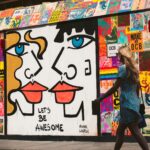A version of this essay was published in the Illumination publication on Medium several weeks ago.
These days, I wish as hard as I can for good things that are considered impossible to happen, like there actually being a Santa Claus with a whole team of people way up North who spend all year working on ways to gift the world with love and happiness and really cool new technology to boot. I also wonder sometimes whether we’ll be alive when the next truly artistic and creative musically gifted songwriters come along the way the Beatles did and don’t just change the course of music, but change the power of creativity and aesthetics for artists everywhere. I think and wish for that kind of stuff, because I firmly believe that envisioning amazing things is the only way we get beyond the malaise we’ve built for ourselves here in the 2020s.
I also wish people read and talked about utopian concepts more, and at least believed in the real possibility of more ideal societies. Whether we like it or not, the job of life will always be to build a better future for all of humankind. Note that italicized word there. It’s important.
Fifty to sixty years ago, we used to have awesome disagreements about what building a “better future” meant. Nowadays, most people don’t even seem to understand the idea of building, let alone making things better. We’ve slipped pretty far, which may be a reason for why there is so much negativity bouncing around — especially in the digiverse.
Which all begs the question: when will we return to the idea and the possibility that each of us understands the need to step up and work as best we can to solve global problems and create a better world? It’s the only way out of here.
The stories we tell each other, and the ones we choose to read to ourselves, determine pretty much everything about what can be possible in this world and what seems impossible. I hear the reality of that all the time these days about climate change. So many thoughtful, educated, and concerned people see the idea of individual effort as more or less inconsequential. The belief is that we need profound, systemic structural change and that government has to drive that change. The reality, of course, is that governments (and politicians) really only act when the people act first.
Privacy and Hope
I see the idea of empowered individuals looking to solve problems like climate change as an opportunity to at least create our own private utopias. Obviously, in the end, we solve the global warming puzzle on the personal level and on the systemic level simultaneously.
But in Buddhism there is the saying: “With our thoughts we make the world.” That saying is pithy and pretty much true, although it is likely not something Buddha ever said. Also, it’s important to note that our thoughts aren’t just words and ideas, they’re emotions, too, along with our basic unconscious understanding of existence. Reading about various utopian struggles, reading especially about individuals rebelling in hostile worlds and searching for their dreams and fantasies, helps foster thoughts, concepts, feelings, and a deep awareness of how to make things better around us.
“With our thoughts, we make the world.”Buddhism (although not Buddha himself)
Granted, the near wholesale elimination of utopian stories and concepts from our recent day-to-day lives in favor of dystopian tales and tragedies — from The Hunger Games and The Handmaid’s Tale to Game of Thrones and The Terminator — is big business and entertainment for a huge swath of fellow citizens. Even attempts to create stories about positive future worlds, stories like Logan’s Run, The Giver, The Glass Bead Game, and James Cameron’s Avatar saga, tend to be more about the problem with idealism and positivity than how to fight in order to maintainn and enhance the good life.
Barefoot in the Snow
Thinking back to my utopian reading days in the late 1960s and much of the 1970s, it was more or less a thing for us all to consider idealistic notions, and to seriously discuss what we needed to do in order to make a better world. We read novels like Erewhon, Ecotopia, The Kin of Atta Are Waiting for You, Island, The Dispossessed, Childhood’s End, Be Here Now, etc.
The point of studying, debating, and thinking about utopias was never because we felt that a perfect society could be achieved, or that suffering might be eliminated for all people, everywhere, for all time. We understood, at least implicitly, that we were getting something important out of our readings and discussions, something personal and communal that was as much about spirit as it was about the possibility of a better world for all.
My favorite novel back then was Islandia, by Austin Tappan Wright. It’s a story about a fictitious, hard-to-find island culture that is essentially a version of 19th century New England if it had remained agrarian. That thousand page book changed my life and helped me understand that utopian notions are as much about personal conviction and certainty as they are economic, environmental, and sociological solutions.
I’m not suggesting here that we also walked to school barefoot in the snow back in the day (most of us had good snow boots). I’m sure there are young people out there right now who are reading utopian books for school. Next summer, a friend of mine will be publishing “The Solutionary Way: Transform Your Life, Your Community, and the World for the Better” (look it up). It’s not a novel, but it’s definitely pointing in the direction of idealism and creative problem solving.
Super Heroes and Beyond
Perhaps one of the main reasons people are so enamored with super hero movies here in this ultra-modern global life is because super heroes give audiences a sense of pushing human potential in a more positive direction, especially in the dark battle with evil, small-mindedness, and those looking to destroy things.
We think of worship of the ancient Greek gods as somehow a more fundamental and primitive form of early religious belief. But weren’t Apollo, Artemis, Hermes, Demeter, etc. modified versions of super heroes? The Athenians seemed at least for a while there to have a basic understanding that their job was building a better world. Heck, Plato’s Republic carries a big chunk of utopian thinking forward for all of us to study, even now here in the Twenty-Twenties. The Greek gods explained and represented both sides of the fence for human society, but the best ones, the ones we all revere, leaned heavily on the idea of fighting for a just and good world.
Sadly, it’s very true that none of us are super heroes or gods. Not exactly anyway.
Perspective and Understanding
It’s a funny thing, then. That “just and good” world has always been there right along side the world in chaos and aggression. The problem is one of perspective and understanding. Perspective is connected to levels of hope and belief. Also, perhaps, how empowered each of us feels. That empowerment is not something we are given, ever. We need to take it. We need to create it for ourselves.
The understanding thing is about reading books, doing research, connecting dots, and seeing the relationship between how we feel here in this world and what we want to do about those feelings. That’s what those utopian stories were actually all about. Even when they wound up showing readers how hard it is to truly solve the problem of what it means to be human.
A couple recommended reads I’ll make here at close are Heaven is a Place on Earth, by Adrian Shirk (2023) and Utopia for Realists, Rutger Bergman (2017). Folks in younger generations are still thinking the world through, that’s for sure. One question though is how many people are actually reading the work that these bold thinkers are doing. Are you?
Final note: if you have a utopian-type book or story you think people should be aware of, please feel free to leavea link here, especially if it’s something new and recent.

